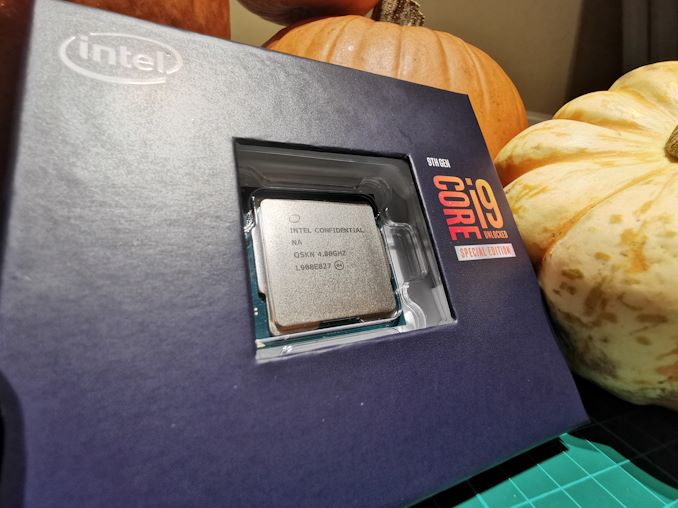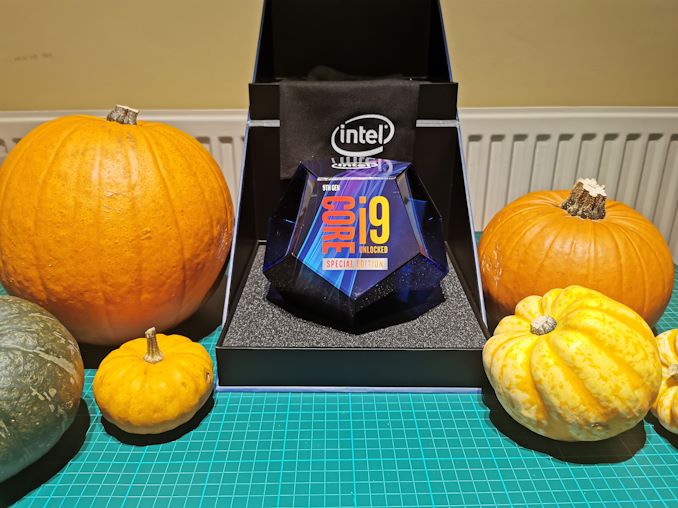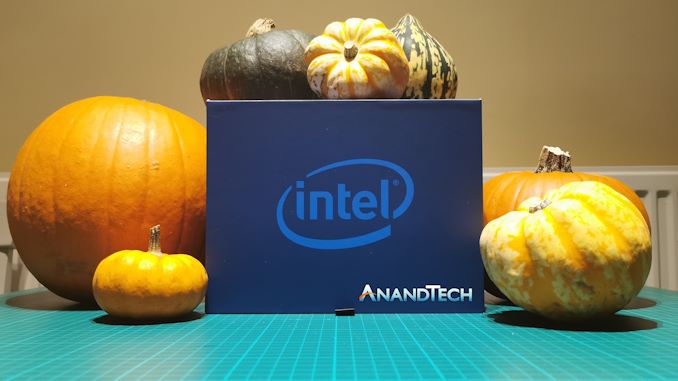The Intel Core i9-9900KS Review: The 5 GHz Consumer Special
by Dr. Ian Cutress on October 31, 2019 10:45 AM ESTConclusion
The Intel Core i9-9900KS is Intel’s first consumer level all-core 5.0 GHz processor. Technically Intel has launched an all 5.0 GHz processor before: earlier this year the Core i9-9990XE was launched into the high-frequency trading market, which had 14 cores at 5.0 GHz, but that part is an auction only part for select business partners. What the Core i9-9900KS does is bring the same principle down to a more consumer friendly core count and a more consumer friendly price point. The tray price is set at $513, although it’s likely to be sold for much more than that.
Playing To Power
One of the key elements I wanted to test in this review is how the chip responds to Turbo. As we’ve discussed at length, and confirmed by Intel: the guidelines for the Turbo settings are not set in stone. Intel actively encourages its motherboard partners to increase these settings if the motherboards are over-engineered to be able to do so. This means that a high-end motherboard should be able to give a longer turbo than a cheap board.
A longer turbo might not mean much. When the turbo budget has run out, the system will limit the chip to the TDP setting in the BIOS (which should be the one on the box), and will try and maximise the frequency for the power limit. On a lot of chips, this means you still have a very high frequency, nowhere near the base frequency. But the power limit does have benefits such as acting as a thermal control at least.
In our test, we used MSI’s Z390 Gaming Edge AC. It’s a mid-upper motherboard, but it set our Core i9-9900KS to have a TDP and turbo power limit of 255W. Intel’s ‘guidelines’ state a TDP of 127 W and a turbo power limit of 159 W. When comparing the two, there are some distinct advantages for the 255W setting, such as 10%+ performance on rendering, but the 159W setting does afford 10C lower temperatures in those heavy workloads. Ultimately, as the name TDP = Thermal Design Power implies, it all comes down on your ability to cool the chip.
For gaming, the turbo budget didn’t seem to matter at all, except in a few tests at super low resolution and settings.
One question that does remain however, is which set of results should we keep? The 255W results are what we get out of the box, and the 159W results are only 'Intel guidelines that Intel expects none of the board manufacturers to keep to'. Ideally we keep both, but that's a mess in its own right.
Planning Against The Competition
There’s no getting around giving Intel kudos for binning enough processors to commercially sell an all-core 5.0 GHz chip. In our benchmarks, we see it steaming ahead of any other consumer grade processor when it comes to single core performance. Users are likely to be able to push that single (or dual) core turbo a bit higher as well, although the power limits should be monitored.
It should be noted that in most cases, the Core i9-9900KS either matched or excelled against the previous king of Intel’s consumer desktop line, the Core i9-9900K. There were a few select instances, namely benchmarks like Handbrake, DigiCortex, F1 2018, and 7-zip, where we did see performance regressions that we weren’t expecting. We’re going to have to go back to Intel to see exactly what these are. But they seem confined to very specific workloads.
Overall, the Core i9-9900KS is Intel’s best ever consumer processor.
In ST performance metrics, it wins. In variable threaded metrics, it either wins or does really well. In MT performance metrics, it depends on how strong AMD’s 12-core hardware really is, and how multithreaded the calculation really is. As Intel slowly adds AVX-512 to its consumer line, as it is with Ice Lake, then the MT competition is going to be really interesting.
Only Available For A Short Time Only
While the Core i9-9990XE is a 14-core 5.0 GHz chip, it is an OEM only part sold by Intel at auction only, whereas the Core i9-9900KS should experience wider availability at retail, albeit for a limited time.
Our colleagues at Tom’s Hardware reported that Intel stated in a promotional video that the processor would only be available during the holiday season of 2019 – or at least that the stock level would not be replenished after the holiday season. When we approached Intel asking for confirmation, we were told:
This special edition processor will be available for a limited time only. It can be found at retailers worldwide. We are not disclosing unit quantity information. However, the Core i9-9900KS will have very limited availability.
There is no doubt that there will be some CPUs available into 2020, however it would appear that Intel is only making one main batch of hardware, and once it has gone, it has gone. This might make the $513 tray price that Intel is putting on the part a bit of a misnomer, as retailers might take advantage of this. This will take the shine off the Core i9-9900KS a little, as at $529 or so it would easily be recommended over a Core i9-9900K. If it goes to $599 or $649 because of its limited release, then it becomes less of an interesting buy.
Ultimately the Core i9-9900KS is going to end up in the hands of enthusiasts who want nothing more than the best, but don’t want to jump to the high-end desktop platform. Despite the Intel chipsets for consumers, it’s still a shame that these processors only have 16 PCIe 3.0 lanes, given the desire for direct attached PCIe storage in this market.













235 Comments
View All Comments
Jorgp2 - Thursday, October 31, 2019 - link
Did you actually read the article?Korguz - Thursday, October 31, 2019 - link
um.. it is a 172w cpu.... did you read it jorgp2 ?? intel tdp... is crap.. this is listed as being a 127 w cpu.. at BASE frequency. at 5ghz... it will probably use 172 w.. or morevMax65 - Friday, November 1, 2019 - link
Err...no...der8aur jus tested the 9900KS and it runs games all core 5GHz at between 98w and 126w....Video showing this starts at 3:50..It just depends on what you are doing and whether you are using heavy compute applications but for most games and normal day to day usage no it will hapily run under well under 172w... and that will never be an issue and that's really where this CPU is targeted...albeit those with deeper pockets...https://www.youtube.com/watch?v=YWSn0cHauJ4
Korguz - Friday, November 1, 2019 - link
what was his test setup ??? does it state that ?? i dont see how this chip can use less power. then its own siblings.GreenReaper - Saturday, November 2, 2019 - link
It's possible that it is if the chip is more power efficient (i.e. needs a lower voltage for a given load), which it has to be just to reach 5Ghz on all cores without sending power through the roofDigitalFreak - Friday, November 1, 2019 - link
Yep, I did. Their testing showed that all cores running at 5Ghz had the CPU using 172W. If you're not going to keep all cores running at 5Ghz, except during idle, what's the point of buying this over a 9900K?vMax65 - Friday, November 1, 2019 - link
I am not sure how you missed it but he clearly says when running CSGO, SOTTR and even Timespy GT1 and GT2 the CPU is always at all core 5GHz all the time with max power draw between 75w and a 126w.....He clearly states that at 4 minutes and onwards...The only time this CPU will draw max power of 170w is when you are doing heavy duty compute loads or testing with AVX...For normal use like gaming...this is what most people will buy it for it will never be at 170w plus..
Korguz - Friday, November 1, 2019 - link
again.. you dont state what the test setup was. how it was configured.. so, either he did something wrong, or anandtech did, and sorry to say, i trust AT more...vMax65 - Saturday, November 2, 2019 - link
Asus z390 maximus xi extreme, RTX 2080Ti and not sure what RAM...but as he cleary states this was during the bechmark runs and in the comments he covers forgetting to mention the 2080Ti but clarifies this point. Bottom line for 'normal' gaming usage this CPU will run all core 5GHz all the time at on or under 127w...vMax65 - Saturday, November 2, 2019 - link
And Anandtech tested power with Cinebench...not with games....